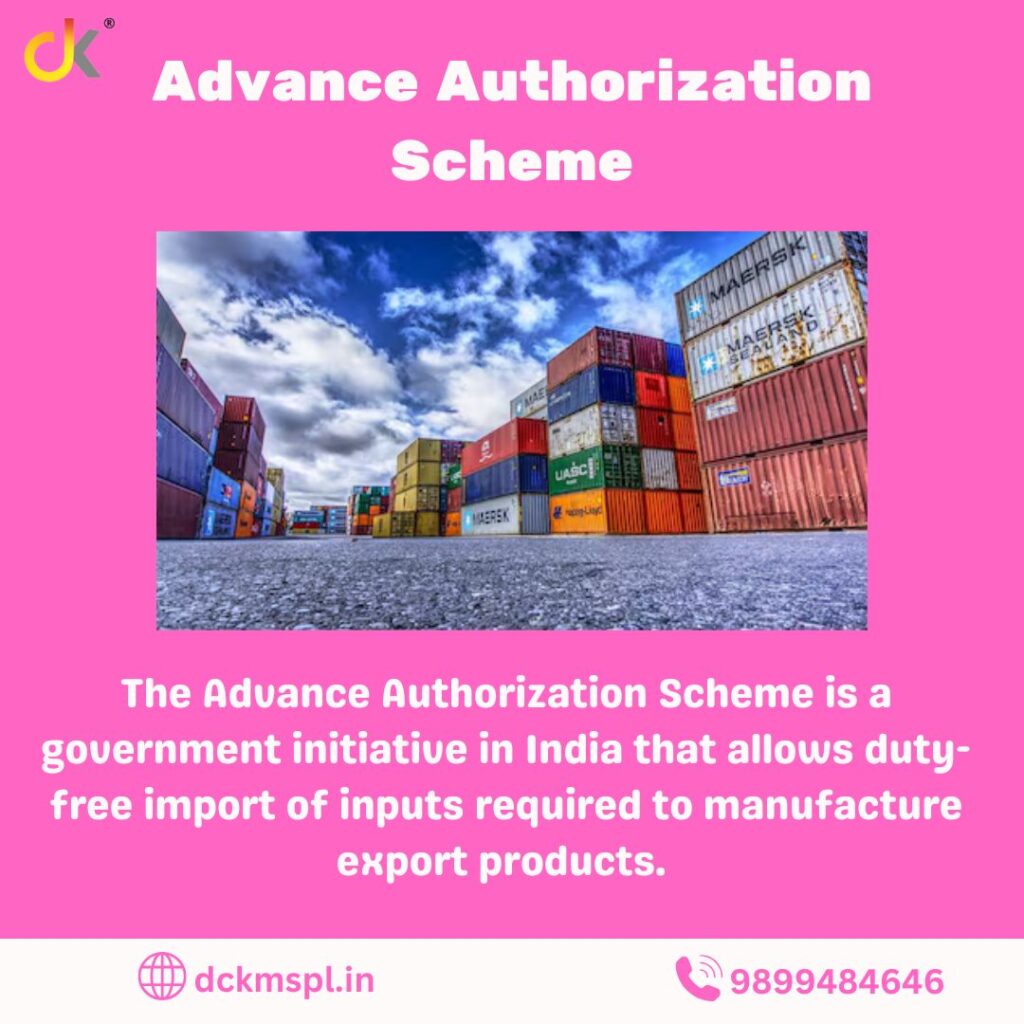The Advance Authorization Scheme (AAS) is an important initiative by the Indian government aimed at boosting the country’s export competitiveness by allowing duty-free import of raw materials. This scheme helps manufacturers lower production costs and encourages them to compete in the global market. Here’s an in-depth look at what the Advance Authorization Scheme entails, its benefits, eligibility criteria, and the application process. To benefit from this, businesses must meet export obligations within a specified period, ensuring that imported goods are used in producing export-oriented products.
What is the Advance Authorization Scheme?
The Advance Authorization Scheme allows businesses to import raw materials, components, or consumables without paying any customs duty, provided the imported goods are used in the production of export items. The finished products must be exported within a stipulated time frame to meet the export obligation under the scheme. This facilitates cost-effective manufacturing and helps Indian businesses expand their presence in international markets.It helps reduce production costs and enhance the global competitiveness of Indian exporters. The advance authorization scheme also allows for the transfer of input materials to third-party manufacturers for processing.
Key Features of the Advance Authorization Scheme
- Duty-Free Imports: The primary feature is the waiver of customs duty on the import of inputs required for producing export items. This can include raw materials, components, and packaging materials.
- Export Obligation: To benefit from the scheme, businesses must fulfill an export obligation, which is typically a specified quantity or value of finished products that must be exported.
- Transferability: The scheme permits the transfer of inputs to third-party manufacturers for job work, making it easier for businesses to outsource specific production processes.
- Validity Period: The authorization has a limited validity period within which the imported materials must be utilized, and the corresponding export obligations fulfilled.
Benefits of the Advance Authorization Scheme
- Cost Savings: By allowing duty-free imports of raw materials, businesses can significantly reduce production costs, making their products more price-competitive in the international market.
- Increased Export Competitiveness: With lower manufacturing costs, companies can offer competitive pricing for their exports, helping them gain a stronger foothold in global markets.
- Encourages Value Addition: The scheme encourages industries to add value to imported raw materials and components, thus promoting domestic manufacturing and processing.
- Enhanced Cash Flow: Duty exemption reduces upfront capital requirements, allowing businesses to utilize funds for other growth-oriented activities.
Eligibility Criteria for the Advance Authorization Scheme
- Exporters and Manufacturers: The scheme is primarily intended for manufacturers and merchant exporters who produce goods for export.
- Specified Products: The input materials imported must be used in the manufacture of products that are on the eligible export list.
- Export Obligation: Beneficiaries must meet a minimum value addition requirement and fulfill the export obligation within the stipulated time frame.
Application Process for the Advance Authorization Scheme
- Application Submission: Businesses must apply for an Advance Authorization through the Directorate General of Foreign Trade (DGFT) by submitting the necessary documents, including the bill of materials, past export performance, and export orders.
- Approval from DGFT: Upon reviewing the application, the DGFT grants the Advance Authorization, specifying the quantity and value of input materials that can be imported duty-free.
- Fulfillment of Export Obligation: Once the authorization is granted, businesses must import the inputs, manufacture the export products, and fulfill the export obligations within the set validity period.
- Redemption of Authorization: After meeting the export requirements, the business can apply for redemption of the authorization, which is verified by the DGFT.
Challenges Faced by Exporters
While the Advance Authorization Scheme offers several benefits, businesses may face challenges such as:
- Compliance Requirements: Strict compliance with the conditions and documentation can be time-consuming.
- Export Obligation Monitoring: Monitoring the fulfillment of export obligations within the prescribed time can be challenging.
- Changes in Policies: Frequent updates to trade policies may require businesses to stay informed and adapt their practices accordingly.
Conclusion
The Advance Authorization Scheme is a powerful tool for Indian manufacturers and exporters, enabling them to compete effectively in the global market by lowering production costs and boosting export competitiveness. While the scheme offers numerous advantages, businesses need to navigate the compliance requirements carefully to maximize its benefits. For exporters aiming to expand their international footprint, the Advance Authorization Scheme serves as a significant enabler, fostering growth and contributing to India’s economic development.By understanding the intricacies of this scheme, businesses can leverage it to achieve sustainable growth and long-term success in the export sector.The Advance Authorization Scheme is a government initiative in India that allows duty-free import of inputs required to manufacture export products.
